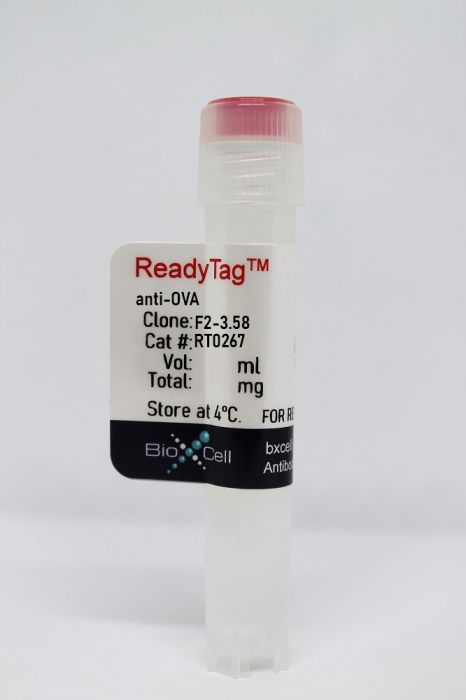ReadyTag anti-OVA
Product Details
The F2-3.58 monoclonal antibody reacts with ovalbumin (OVA). OVA is a 45 kDa protein found in egg white that is commonly used in several different research areas. The protein is used to stimulate allergic inflammation in laboratory animals and is an established model allergen for airway hyper-responsiveness. OVA is also used in proteomics as a molecular weight marker.Specifications
| Isotype | Mouse IgG1 |
|---|---|
| Recommended Dilution Buffer | InVivoPure pH 7.0 Dilution Buffer |
| Conjugation | This product is unconjugated. Conjugation is available via our Antibody Conjugation Services. |
| Immunogen | Phosphoprotein constituent of egg white |
| Formulation |
PBS, pH 7 Contains no stabilizers or preservatives |
| Endotoxin |
<2EU/mg (<0.002EU/μg) Determined by LAL gel clotting assay |
| Purity |
>95% Determined by SDS-PAGE |
| Sterility | 0.2 µm filtration |
| Production | Purified from cell culture supernatant in an animal-free facility |
| Purification | Protein G |
| RRID | AB_2651130 |
| Molecular Weight | 150 kDa |
| Storage | The antibody solution should be stored at the stock concentration at 4°C. Do not freeze. |
Recommended Products
ELISA
Qiao, S. W., et al. (2008). "Dependence of antibody-mediated presentation of antigen on FcRn" Proc Natl Acad Sci U S A 105(27): 9337-9342. PubMed
The neonatal Fc receptor for IgG (FcRn) is a distant member of the MHC class I protein family. It binds IgG and albumin in a pH-dependent manner and protects these from catabolism by diverting them from a degradative fate in lysosomes. In addition, FcRn-mediated IgG transport across epithelial barriers is responsible for the transmission of IgG from mother to infant and can also enhance IgG-mediated antigen uptake across mucosal epithelia. We now show a previously undescribed role for FcRn in mediating the presentation of antigens by dendritic cells when antigens are present as a complex with antibody by uniquely directing multimeric immune complexes, but not monomeric IgG, to lysosomes.


